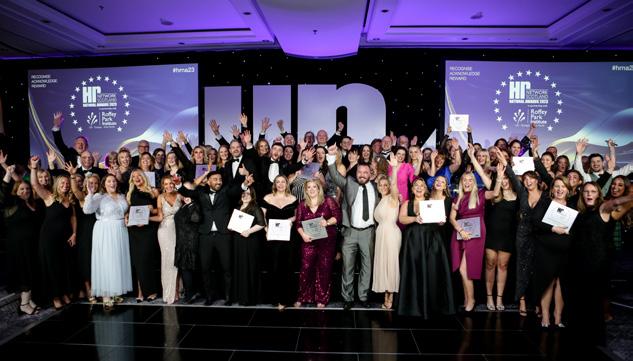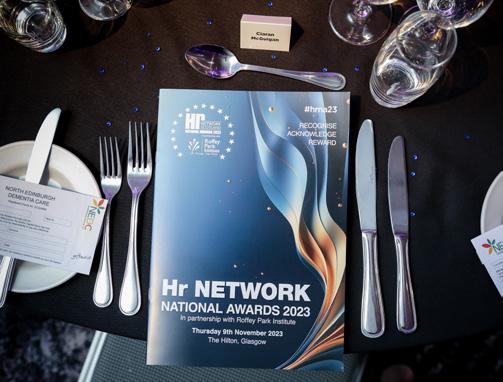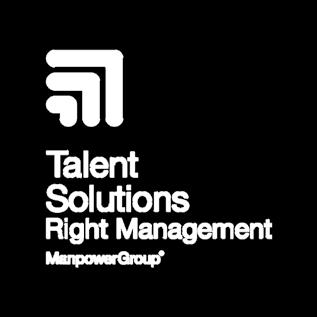MAY 2024 VOLUME 20 ISSUE 5 A MEDIA AVENUE PUBLICATION | www.hrnetworkjobs.com Inspiring People Development Neurodiversity: Neurodiversity: SPECIAL FEATURE: HRM EDUCATION AT A CROSSROADS I’M DIFFERENT. I’M NOT LESS!

2 unique experiences

an experience, like no other
Our newly renovated showroom is open and ready to be rediscovered. We recently embarked on an incredible transformation to create a space that celebrates heritage whilst innovating with contemporary design.
3 hamiltonandinches.com
16
COVER STORY
Neurodiversity: I’m different. I’m not less!
Neurodiversity is a huge discussion topic for HR professionals right now with the incredible opportunity for them to tap into the fresh perspectives, analytic thinking and exceptional cognitive skills among the many attributes of neurodivergent people. Andy Moore discovers how HR can maximise neurodiversity in the workplace.
CONTENTS 4





8 8 News 14 Employment Law Update Employment Law Updates for 2024 20 Stats Getting hybrid workers back to the office 22 Feature Two Nominations for the Hr NETWORK National Awards 2024 28 The Bookshop Latest bestsellers to the published 30 Feature Three Preview of the Future Leaders Hr NETWORK Conference & Exhibition 2024 34 Special Feature HRM Education - At A Crossroads 38 Extra A Skills Based Approach – Enhancing Talent Management 42 Insights Bereavement, Bias in Recruitment 44 Event of the Month A review of Hr40 Dinners for March and April 46 My LinkedIn Lynn Killick, Leading Kind 38 42 22 34 CONTENTS 5





Fiona Winning
AAB People
Employment Law Update: New Legislation in 2024 p. 14
Professor Dennis Nickson
University of Strathclyde
Special Feature:
HRM Education at a Crossroads p. 34
Dr. Arlene Egan
Roffey Park Institute
Extra: A Skills Based Approach p. 38
Karen Hibbert
Keech Hospice Care
Insight: Bereavement in the Workplace p. 42
Dean Sadler Tribepad
Insight: Bias in Recruitment p. 43
Media Avenue Limited
18 Young Street, Edinburgh, EH2 4JB 0131 625 3267
www.hrnetworkjobs.com www.mediaavenue.co.uk
Founder and Publisher: Lee Turner lee@hrnetworkscotland.co.uk
Senior Associate Editor: Andy Moore editor@hrnetworkscotland.co.uk
Deputy-Editor: Teresa Flannigan editor@hrnetworkscotland.co.uk
Editor-At-large: Neil Archibald editor@hrnetworkscotland.co.uk
Editor’s Assistant/Admin: Freya Turner editor@hrnetworkscotland.co.uk
Advertising/Sponsorship: Donna Turner advertising@hrnetworkscotland.co.uk
Design: Media Avenue Ltd
Hr NETWORK now available on:
LinkedIn: uk.linkedin.com/in/ hrnetwork1
Twitter: www.twitter.com/ HrNETWORKNews
YouTube: www.youtube.com/ user/hrnetworkscotland
The views expressed in Hr NETWORK (SCOTLAND) are those of invited contributors and not necessarily those of Media Avenue Ltd. Media Avenue Ltd does not endorse any goods or services advertised, or any claims or representations made in any advertisement in Hr NETWORK (SCOTLAND) magazine and accepts no liability to any person for loss or damage suffered as a consequence of their responding to, or placing reliance upon any claim or representation made in any advertisement appearing in Hr NETWORK (SCOTLAND)magazine. Readers should make appropriate enquiries and satisfy themselves before responding to any such advertisement or placing reliance upon any such claim or representation. By so responding or placing reliance readers accept that they do so at their own risk. © Media Avenue Ltd. 2024.
6 CONTRIBUTORS
May 2024

Welcome to the May 2024 online issue of Hr NETWORK magazine. We have lots of activities going on in the events calendar just now and in particular, the forthcoming
Hr NETWORK ‘Future Leaders’ Conference & Exhibition 2024 taking place at the magnificent Scottish Gas Murrayfield Stadium in Edinburgh on Thursday 9th May.
Just ahead of the Conference, we’re hosting the hugely anticipated annual Leaders Dinner, which will attract almost 200 specially invited senior HR and people industry professionals to what promises to be a great evening of networking, knowledge sharing and the highlight of the evening will be an interview with multi-award-winning social entrepreneur, intersectionality & neurodiversity professional speaker and founder of ADHD for girls, Samantha Hiew.
We’ve also hosted a number of smaller, more intimate events recently, including our March Hr40 Dinner, which we co-hosted with our long-term supporters Right
Management and then our April Hr40 Dinner with our partners Roffey Park Institute. Both events showcased in Event of the Month on pages 44 and 45.
In between our two Hr40 Dinners, we also hosted our first event in Aberdeen since well before the pandemic struck, which was our hugely successful ‘Drinks & Nibbles’ evening along with our great partners PTR, with the event being held at the fantastic ‘SugarBird in the Gardens’, in the heart of the Granite City.
As well as the Awards Judging process and prior to the Awards Gala Dinner on the 14th November at the Glasgow Hilton, we will also host the annual Nominees Lunch in Edinburgh in October.
Our Conference Planning Team is currently pulling everything together for early May and a huge thank you to everyone who has booked their place so far and we hope a few more delegates will be able to book your place before the Conference takes place.
Hr NETWORK Awards Gala Dinner 2024
There is one month to go for the deadline for Nomination entries for this year’s Hr NETWORK National Awards and the prospect of hosting the 17th Awards Gala Dinner again in November. We are extremely grateful to all our sponsors and table hosts
for their wonderful and continued support again this year and if you would like to join us at the Gala Dinner with your guests, please contact the Awards Planning Team as soon as possible.
This Issue
Neurodiversity is a huge discussion topic for HR professionals right now with the incredible opportunity for them to tap into the fresh perspectives, analytic thinking and exceptional cognitive skills among the many attributes of neurodivergent people. Andy Moore discovers how HR can maximise neurodiversity in the workplace.
The regular sections of the magazine include: Stats, the Bookshop and a range of Insight features on some hot topics in the people management & development world.
I hope you enjoy your online copy of Hr NETWORK Magazine and look forward to welcoming you to our events this year.
Lee Turner Publisher
Contributors: Fiona Winning, Professor Dennis Nickson, Dr. Arlene Egan, Karen Hibbert, Dean Saddler.
7
WELCOME
A third of young workers believe their employers do not care about sustainability
In light of World Earth Day recently, new research from employee benefits technology company Zest, finds that workers across the UK are increasingly focused on sustainability and expect their employers to do more – particularly younger generations.
Half (51%) of employees are keen to see their company invest more in sustainability, rising to 61% of younger workers aged 18-34.
The research from Zest also reveals that over half (53%) would like to see their company investing in more sustainable benefits such as electric vehicles and sustainable pensions, similarly rising to two-thirds (66%) of 18–34 year olds - and these demands are not going unnoticed.
More than four in ten (44%) businesses report an increase in the number of employees asking for sustainable benefits, and over half (53%) say that they have noticed an increase in the employees who care about sustainability over the last year.
Large businesses floundering to tackle cyber threats
Large businesses find it significantly more difficult to manage their cyber security than their smaller counterparts, new research from IDEE has revealed.
The cyber security firm commissioned an independent survey of more than 500 IT and cyber security professionals within UK businesses. It found that 74% of respondents from large businesses (more than 500 employees) believe it has become far more challenging to defend against cyber attacks since the Covid-induced rise of remote and hybrid working – only 50% of respondents from small businesses (less than 50 employees) said the same thing.
Just 36% of small businesses said that a lack of skills and knowledge is a major cyber security challenge. In comparison, this figure rose to 68% among large businesses. Meanwhile, 54% of large businesses said they need to simplify their cyber security solutions so that staff can properly engage with them, but this figure drops to 36% among small businesses.
Despite this, employees, particularly younger ones, believe that their company could be doing more.
Although half (50%) of young workers now say that sustainable benefits are the most important perks to them, a third (33%) of this age group believe that their employers do not care about sustainability.
Moreover, the research reveals the worrying impact of this disconnect, particularly as younger generations increasingly enter the workforce.
Two in five (42%) aged 18-34, believe that poor sustainability initiatives have a detrimental impact on their morale at work. This not only leaves existing employees demotivated, but businesses at risk of failing to attract fresh talent.
Adopting employee benefits technology can enable greater personalisation and flexibility of benefits –including more sustainable options. Using data and insights, employers can send targeted communications to employees to accommodate changing demands while ensuring that the right benefits reach the right employees at the right time.
Unfortunately, at present just 29% of employees believe that their company’s benefits platform supports their individual needs and two in five (39%) employees would like their company to invest in their benefits platform more to increase accessibility.
However, while evidently struggling more to protect their IT systems, large businesses were found to be far more aware of the risks they are facing and the implications of them. For instance, 92% of respondents from large businesses said they understand the financial costs that are associated with a cyber breach, compared to 73% of respondents from small businesses.
Al Lakhani, CEO of IDEE, said: “More employees, more systems, larger supply chains, reliance on legacy IT –there are numerous reasons why cyber security becomes more challenging the bigger a business gets. But recent headlines of breaches involving the Bank of America breach underline that enterprises are also a victim of their own outdated, backward approach to cyber security.”

NEWS
8
What it’s like to experience burnout as an autistic person
In a recent study, 1 in 5 workers said they’d taken time off work in the past year due to poor mental health caused by pressure or stress. Meanwhile, accountants reported an even higher rate of burnout, with over half (50%) saying they’re struggling.
Learning how to spot the signs of burnout and understanding your personal triggers is an important part of preventing it and maintaining your mental wellbeing.
For autistic people – a social group that makes up more than 1% of the UK population - the causes of burnout can be vastly different to those for neurotypical people, despite the symptoms often presenting the same. This can make prevention and ongoing management more challenging.
How an autistic person experiences burnout is also distinct from the experiences of those without autism. For example, autistic people experiencing burnout may be more susceptible to depression and anxiety, as well
as problems with their executive functioning (e.g., trouble managing their emotions, and inability to multi-task).
Unlike burnout in neurotypical people, which often stems from competing stressors such as workplace pressure and relationship issues, autistic burnout arises from the stresses that present from having to live in a neurotypical society.
Many autistic people experiencing burnout indicate that their health, particularly their mental health suffers excessively. Depression and anxiety are both common symptoms among autistic people with burnout. Autistic burnout can also impact a person’s ability to live independently.
If you’re autistic, the best way to prevent and manage burnout is to educate yourself on what the different symptoms might look like for you. Having a clear idea of warning signs or situations that can trigger burnout and knowing a plan for how to manage burnout is key to stopping it from spiraling out of control.
As more of us increasingly report feelings of burnout, it’s important to have an awareness of how this experience might be different for those who are autistic. From being aware of the signs of autistic burnout and the best prevention and management strategies, you can take proactive steps to improve your mental wellbeing and prevent long-term burnout.


NEWS
There’s been no shortcut to this point, but you did it! Your new job is a reality. Your thoughts now turn to how you make the right impact from day one. Your First 90-Day Roadmap™ allows you to manage your entry into a new role. It provides a structure that will help you get started, enhance your chances of success and saves you time. Visit www.befutureready.today and find it in Roadmaps. Your First Roadmap™ 90 Days 9
Equality watchdog advises employers on updated pregnancy and maternity protections in the workplace
The Equality and Human Rights Commission (EHRC) recently published an updated toolkit to provide employers with clear advice on what they should do to prevent pregnancy and maternity discrimination at work.
This updated guidance reflects changes to the law, which have come into effect last month (April 2024). The toolkit gives detailed guidance on what action employers must take before, during and after their staff take maternity leave, to ensure they are protected from discrimination.
The toolkit sets out the changes employers will have to make, which include:
• Extending protection from redundancy to include pregnant women and those on maternity, adoption and shared parental leave
• Offering suitable alternative employment to pregnant women and those on maternity, adoption and shared parental leave in a redundancy situation, including having priority over other employees regarding alternative roles
• Providing the right to request flexible working from the first day of employment
• Increasing flexibility in how paternity leave can be taken. All employers should review the advice and ensure their policies are fully compliant with the law, so pregnant staff, and staff taking parental leave, receive the full protections they are entitled to
Baroness Kishwer Falkner, Chairwoman of the Equality and Human Rights Commission said: “As Britain’s equality watchdog, we have a duty to explain the law around pregnancy and maternity rights to employers, employees and the public. “An employer understanding their legal duties is the foundation of equality in the workplace. Our revised toolkit explains those legal obligations and provides employers with practical advice on how they can best support pregnant women at work and ensure those staff taking parental leave are not discriminated against.”

Women less likely than men to believe they can get into university
Women are more pessimistic than men about their chances of getting accepted into university, reveals new research by the University of Cologne.
The study, conducted by Professor Marita Jacob, in collaboration with Melinda Erdmann and Marcel Helbig, Berlin Social Science Center, investigated why female upper secondary school students may refrain from enrolment into college or university.
They found women are more pessimistic than men about achieving their aspirations of going into higher education, despite the fact they are equally interested in pursuing higher education as their male counterparts –women even express higher aspirations for college enrolment than men.
The researchers say that while factors such as probability of success and perceived cost impact both genders, young women are also affected by formal
restrictions limiting entry to their preferred fields of study. For example, there are high entry requirements for medicine, psychology or law and many women often don’t believe they will achieve the correct grades to be accepted.
“The finding that women do not realise their college aspirations is particularly noteworthy, as women on average achieve higher grades than men, giving them a considerable advantage in the competition for scarce study places. The first ‘leak’ in the pipeline for academic careers in Germany therefore occurs even before actual enrolment”.
In order to enable more talented young women to realise their academic ambitions and to counteract the phenomenon of “lost talents”, the researchers particularly advise forming initiatives such as guidance counselling to encourage and support young women and men in pursuing their goals.
NEWS
10
Parents sacrifice savings as 3 in 10 have reduced hours or left work due to childcare costs
Phoenix Group, the UK’s largest long-term savings and retirement business, has found a quarter (25%) of adults with a child under five have reduced their working hours due to childcare costs, and a further 4% have left work entirely. This is resulting in longer-term consequences for parents’ retirement saving, as pension contributions decrease or are paused during time away from work.
The research was carried out ahead of the first phase of the government’s childcare support package coming into effect. From April 2024, working parents of twoyear-olds will be eligible for 15 hours of free childcare support per week, over 38 weeks of the year.
Phoenix Insights, Phoenix Group’s longevity think tank, previously found that caring responsibilities often fall disproportionately on women, and limited access to affordable childcare means many are left with no choice but to work part-time. This was reflected in the research, which found that women with a child under five were significantly more likely than men to reduce their working hours because of childcare responsibilities (36% compared to 15%).
The research also looked at who adults with a child under five rely on for childcare during the working week. The child’s other parent/partner was the most relied upon, but this was closely followed by nurseries and grandparents.

Illegal or inappropriate behaviour observed or experienced by over 40% of employees
New research finds that half (52%) of employees are now more aware of the importance of whistleblowing than before due to media reporting on high profile cases. However mistrust around possible retaliation and reliable process still holds many back from reporting workplace misconduct.
That’s according to a recent survey of 2,000 employees commissioned by Personio, Europe’s leading HR software company for SMEs. With 43% of employees having seen or experienced some kind of inappropriate or illegal behaviour at work, the research reveals that workplace misconduct is common, and often unchecked.
One in ten (10%) employees have witnessed or experienced sexual harassment at work, but nearly half (49%) of these did not report it. Similarly, almost one third (30%) have seen or experienced bullying at work, with 44% of these not reporting it.
Pete Cooper, Director of People Partners & DEI at Personio, commented: “The extent of workplace misconduct is worrying, and the rate at which these go unreported is even more so. It’s clear that having whistleblowing channels in place is only one small part of the puzzle to make workplaces safer. A workplace culture that prioritises trust and transparency is critical. People need to understand that these reporting processes exist, feel safe using them, and have trust in their organisation to listen to and act on their concerns.”
NEWS
11
5.7 million people facing the ‘carers penalty’ –with women being the most affected
From 6 April 2024, the government has brought in the new ‘Carer’s Leave Act’ that will offer employees the entitlement to unpaid leave to give or arrange care for a ‘dependant’ who has a physical or mental illness or injury that means they’re expected to need care for more than 3 months, a disability (as defined in the Equality Act 2010) or care needs because of their old age.
The dependant does not have to be a family member and can be anyone who relies on them for care.
Employees are entitled to one week of leave within a 12-month period, with the term ‘week’ defined by the length of time typically worked over seven days. For instance, if an individual typically works three days a week, they can take three days of carer’s leave. This leave can be taken as a continuous week or as individual days or half-days throughout the year.
Violence against shop workers doubles in the retail crime epidemic
Retail trade union Usdaw has recently announced shocking statistics from their annual survey of over 5,500 retail staff showing that 18% of shopworkers suffered a violent attack last year, compared to 8% in 2022.
The increase in assaults comes during an epidemic of retail crime with official stats and reports from retailers showing significant increases in theft from shops. The survey also found the number of incidents has come down since the exceptionally high levels during the pandemic, but remain higher than pre-Covid levels in 2019. In the last twelve months (pre-pandemic levels, from the 2019 survey):
• 70% (68%) have experienced verbal abuse
• 46% (43%) were threatened by a customer
• 18% (5%) were assaulted
Paddy Lillis – Usdaw General Secretary says: “No-one should feel afraid to go to work, but our evidence shows that too many retail workers are. It is shocking that nearly a fifth of our members working in retail are being assaulted for simply doing their job and serving the community. They provide an essential service and deserve our respect and the protection of the law.
This will be welcome news for many, particularly women who are often expected to bear the brunt of caring responsibilities, particularly for ageing parents, according to insights TakingCare Personal Alarms. What’s more, one in three women surveyed said they would even consider giving up work to care for the older person in their lives.
Women in the sandwich generation are required to juggle care responsibilities with family life and jobs of their own, with further insights from TakingCare’s report, Unpaid and under pressure: are Brits trapped caring for elderly parents? showing that one in two people saying they have “no choice” but to care for their elderly parents when they become too frail.
Additional leave for caregivers provides essential peace of mind, particularly for those balancing a number of conflicting priorities.
“Violence and abuse is not an acceptable part of the job and much more needs to be done to protect shopworkers. The UK Government has repeatedly failed to act in the face of an epidemic of retail crime, rising theft from shops and assaults against retail workers. It is disappointing that they have no measures in their legislative programme to tackle this issue. We support opposition attempts to amend the Government’s Criminal Justice Bill, so that the law is strengthened to protect shopworkers from violence, threats and abuse.
“A protection of shopworkers law is also supported by many retailers. It already exists in Scotland and has secured over 500 convictions. We also need more neighbourhood police with patrols in town centres, respect orders to ban repeat offenders and an end to the £200 threshold for investigating and prosecuting shop theft. Most of all, we ask the public to support our campaign by respecting shopworkers.”

NEWS
12
Hundreds of British bosses fear AI could steal their jobs
Hundreds of UK chief executives believe that artificial intelligence (AI) could steal their job, underlining widespread fears over the technology’s potential to shake up traditional working models.
Nearly half (43 percent) of CEOs said they felt that their job could be at risk due to AI technology, according to a major new study from AND Digital. Additionally, three quarters (76 percent) of CEOs have launched Artificial Intelligence (AI) training bootcamps this year, to help themselves and their staff stay on top of the latest tech trends.
The findings were revealed in The CEO Digital Divide: are you accelerating enterprise value or slowing it down? report, which surveyed 600 global CEOs and was conducted by independent research company Censuswide.
A worrying 44 percent of CEOs polled said they feel their staff aren’t ready to handle AI adoption amid rapid global developments.
AI amplifies the dilemma confronting CEOs, with onethird (34 percent) opting to ban AI tools like ChatGPT within their organisations. However, 45 percent admitted to secretly utilising AI tools, such as OpenAI’s ChatGPT, to fulfil their job responsibilities, often passing off the work as their own.
Ironically, given the widespread secret use of AI technology, ethical considerations in AI adoption also emerged as a critical concern, with 68 per cent prioritising it as a top issue.
The news comes amid the UK and US forming a new partnership to ensure the safety of AI amid concerns about its future versions. The collaboration aims to jointly develop advanced testing for AI models and share information on AI capabilities and risks.
51%
of workers feel fear of the unknown is holding them back in their professional growth
LHH, a leading integrated talent solutions provider and global business unit of the Adecco Group, today unveiled its findings from the fourth edition of the annual global study: Global Workforce of the Future Report 2024. The report examines the world of work through the lens of 30,000 workers from 23 countries and 25 industries, spanning entry-level workers to senior executives. This year’s survey sought to identify global workforce readiness for digitalization and worker sentiments around job security and expectations for the future, offering recommendations to future-proof the workforce and spur the passive talent pool into action.
Gaëlle de la Fosse, President of LHH, said: “With the profound shifts reshaping the global workforce, the importance of leadership, skills training, and opportunities for internal mobility cannot be overstated. Our latest Global Workforce of the Future Report shows that employee satisfaction and retention is closely related to how a company builds a culture that fosters career growth and invests in skills development.”
Global uncertainty is causing workers to stay put in their current roles for longer, but this should not be mistaken for complete satisfaction. Workers feel a lot less control over their careers than they did at the height of the
Great Resignation, with 52% of workers pointing to external factors and 51% citing a “fear of the unknown” as holding back their professional growth. They also cite barriers such as economic climate (23%), age (22%), and limited opportunities within their own industries (20%). Due to these conditions, nearly three in four workers (73%) plan to stay in their jobs in 2024.
Top talent remains a flight risk despite the ups and downs of the economic climate and other external factors. In fact, a majority of workers (86%) are confident that they could find a new job within 6 months up from 61% in 2022, whether it’s through their own networks (74%), independent job search (71%), or a staffing agency (68%). They’re especially optimistic about a tech-enabled future and their outlook on digitalization, with 65% of workers feeling that it will have a positive impact on their jobs, up from 37% in 2022.
Worker uneasiness has created a significant pool of “passive talent” that is eager for new skills and opportunities, but is fearful to make a move. To take advantage of passive talent and spur movement, companies must understand that employees increasingly want guidance and purpose in their careers, with nearly half (46%) of workers saying they want to change careers but don’t know which path to take.
NEWS
13
EMPLOYMENT LAW UPDATES FOR 2024

 Fiona Winning Senior HR Consultant, AAB People
Fiona Winning Senior HR Consultant, AAB People
As we enter May 2024, the landscape of employment law has already seen some significant shifts, with numerous updates and amendments taking effect in April. The updates mark another chapter in the ever-evolving employment relationship.
The employment law updates bring about some crucial changes that impact various aspects of the workplace. This article outlines the key updates in employment law for 2024.
National Living Wage – 1st April 2024
In addition to significant updates to national minimum wage rates, the national living wage was extended to apply to those aged 21 and over, this was previous only applicable to workers from the age of 23.
Holiday Pay - 1st April 2024
There have been significant updates to how holiday should be calculated for part- year workers or those working irregular hours.
The main changes are outlined below:
• Irregular workers and part -year workers holiday can be calculated at 12.07% of hours worked;
• Rolled up holiday pay will be permitted for irregular hours workers and part -year workers.
The changes came into effect on 1st April 2024 for businesses whose holiday year starts on 1st April, for those whose holiday year starts on 1st January, the changes will be applicable from January 2025.
The Paternity Leave Amendment Regulations 2024 – 6th April 2024
The Paternity Leave Amendment Regulations 2024 introduces changes to statutory paternity provisions where the expected week of childbirth falls on or after the 6th April.
EMPLOYMENT LAW UPDATE
BULLYING & HARASSMENT DATA PROTECTION DISABILITY DISCIPLINE & GRIEVANCE DISMISSAL EMPLOYMENT TRIBUNALS
14
Paternity leave can now be taken in separate blocks of one week, within 52 weeks of the birth or placement for adoption, rather than within the first 8 weeks. The notice period for taking the leave has also been shortened to 28 days.
Employers should review and update their current policies and any communication around paternity leave, ensuring that managers are aware of the updates.
The Protection from Redundancy (Pregnancy and Family leave) Act 2023 – 6th April 2024
The Protection from Redundancy (Pregnancy and Family leave) Act 2023 provides greater protection against redundancy during pregnancy and for a period of 6 months after returning from family related leave. Updates include:
• Pregnant women and new mothers must be offered suitable alternative employment, if available, in a redundancy situation and this right applies from the point that an employee informs their employer that they are pregnant;
• Extended redundancy protection period until 18 months after the birth or adoption of the child.
The protection also applied to those who have recently returned from adoption leave and/or shared parental leave.
The Carers Leave Act 2023 - 6th April 2024
Employees are now permitted to take up to one week of unpaid leave per year to provide or arrange for the care of a dependant with a long-term care need. The leave can be taken in periods of a day or half days.
The entitlement is a day one right and the right to take leave will depend on the relationship between the employee (the carer) and the individual they are providing care for, and the individuals care needs. Employees will be able to self-certify this absence and will not have to provide evidence of the requirement for care.
Flexible Working – 6th April 2024
The right to make a statutory request for flexible working is now available to employees from day one of employment.
In addition, the following changes have also been introduced:
• The employer has a duty to consult with the employee and explore other alternatives if they are unable to grant the request;
• Two separate requests can be made within a 12-month period;
• No requirement for the employee to explain the impact of their new working pattern on the business;
• Requests must be dealt with within two months.
TUPE Consultation1st July 2024
The regulation around TUPE transfers has been updated for transfers taking place on or after 1st July 2024. Where there are no employee representatives already in place, employers may consult directly with employees in relation to a TUPE transfer, if the organisation has fewer than 50 employees or if fewer than 10 employees are to transfer, regardless of the size of the organisation.
Other Legislation Updates in 2024
In addition to the key updates outlined above, there are further changes due to come into effect later in the year, this includes the right for workers to request a more predictable working pattern (September 2024) and the requirement for employers to take proactive steps to prevent sexual harassment in the workplace (October 2024).
What do these changes mean for employers?
Employers should review and update the relevant policies and procedures, and ensure that decision makers within the business are aware of these key updates and the potential implications on working practices.

EMPLOYMENT LAW UPDATE
HEALTH & SAFETY MATERNITY & PARENTAL RIGHTS REDUNDANCY TERMS & CONDITIONS OF EMPLOYMENT TUPE WORKING TIME 15
Neurodiversity: Neurodiversity:
I’m different. I’m not less! I’m different. I’m not less!
Fresh perspectives, analytic thinking and exceptional cognitive skills are among the many attributes of neurodivergent people – those that probably include you and me. Andy Moore discovers how HR can maximise neurodiversity in the workplace.
16
FEATURE
Neurodiversity: Neurodiversity:
17 FEATURE
More people than you imagine in your organisation are neurodivergent. And there is a strong likelihood that you’ll have characteristics too. In the UK, 15-20% of the population is neurodivergent, which equates to around 13 million people, reveals the Institute of Chartered Accountants in England and Wales (ICAEW).
But is neurodiversity valued as much as it should be in the workplace? The qualities that come from a divergent mind are the abilities to take a step back and look at the bigger picture, to strategise and to adapt a bottom-up thinking approach. These are all strengths that allow people to look at the moving parts of an organisation and see where they can fit in.
Neurodiversity extends across a much broader group of people beyond those with autism, ADHD or dyslexia; it covers different learning styles, ways of thinking, communication and cognition. Many of us can recognise these characteristics in ourselves.
This is why, in this article, it’s important to distinguish neurodivergent people as ‘us’, not ‘them’.
Dr Samantha Hiew, Neurodivergent specialist, speaker and interviewee at Hr NETWORK’s forthcoming annual Leaders’ Dinner, says: “Neurodivergents are everywhere, we’ve always been there. But many of us are finding out later in life there’s a label that describes our way of being. We are wanting more purpose embedded in our work. NDs are looking for more opportunities to create impact in their jobs. HR and organisations have a pivotal role to play in this.”
Samantha believes that if HR gets the culture right, then neurodivergents are more likely to be attracted to an organisation, make a positive difference and stay there. Samantha adds that ND skills alone are so important to have in an organisation in times of change, where it needs more problem solvers, innovators and creative thinkers.
“Diversity of thought is a strength as we move towards the age of AI where many of the skills we use at work are increasingly being replaced by tech,” she reasons. “Recent research has showed that over 50% of Gen Z identify as being neurodiverse. So, whether organisations are ready or not, the employment pipeline is increasingly being filled with neurodivergent people.”
In 2022, the UK’s first programme to support neurodivergent people was launched in Scotland. Neurodiversity charity, Salvesen Mindroom Centre, launched its Neuroinclusion at Work Programme, backed by the Scottish Government to help those with neurodivergence such as autism, dyslexia and dyspraxia. The scheme aims to reach one million people by 2026 and will support employers to become more aware, informed and empowered to take action to support individuals within their workplace.
Alan Thornburrow, CEO of Salvesen Mindroom Centre, says: “Employers that recognise, embrace and support neurodiversity are poised to attract and retain the best employees. That’s why we’ve introduced the Neuroinclusion at Work programme to help forwardthinking employers support and develop a neurodiverse workforce.”
Likewise, Samantha believes there is a place for different ‘thinkers’ and ‘doers’ in an organisation, and having diversity of thought enables them to maximise everyone’s strengths through the entire business and delivery pipeline.
So how can HR devise its people policies to embrace neurodiversity? “Policies need to facilitate a culture of understanding and anticipatory welcome,” she points out. “They must also celebrate strengths and help people to know where to look for support. We also need programmes to upskill and develop people’s careers to improve retention.”
Tackling prejudices and misconceptions is also key for HR. Samantha stresses that practitioners can start with company-wide awareness sessions that facilitate understanding of neurodiversity. This will help to encourage unity, acceptance and collaboration, she says. Importantly, it’s about building allies and fostering an inclusion culture, she reasons.
This culture starts with “everyone” in organisation from neurodivergent managers to those across the entire workplace.
HR can make workplace adjustments by inviting requests, making work environments as comfortable as possible to reduce sensory overload, and create a conducive or quiet work setting with flexible and remote arrangements.
“Neurodivergents are everywhere, we’ve always been there. But many of us are finding out later in life there’s a label that describes our way of being. We are wanting more purpose embedded in our work. NDs are looking for more opportunities to create impact in their jobs. HR and organisations have a pivotal role to play in this.”
FEATURE
18


Dr Samantha Hiew.
So how can HR adapt its types of communication to different groups?
“It’s essential to involve those you want to speak with, tailoring your messages so you can fulfil the aims of your communication,” explains Samantha. “Understand how it lands, and if you don’t understand ask people how they can best help you understand what they want to relay.”
Ultimately, effective communication is all about accessibility - as some people may communicate better after having had time to process information and may prefer to write down their thoughts before speaking, she adds.
Summing up, Dr Samantha Hiew, says: “It’s important for organisations to approach inclusion via a holistic perspective; to look at the long-term plan rather than a one-day session. This will spark positive actions around creating a culture that fosters psychological safety and a sense of belonging.”
And remember: “Neurodivergent people are everywhere. We’ve always been there.”
Just like you and me.
Neurodiversity At Work
• Qualities include abilities to take a step back and look at the bigger picture
• Neurodiversity includes a much broader group of people beyond those with autism, ADHD, or dyslexia
• People are looking for more opportunities to create impact in their jobs - HR must play a pivotal role in this
• If HR gets the culture right, Neurodivergents are more likely to be attracted to an organisation
• Policies need to facilitate a culture of understanding and anticipatory welcome
• The right culture starts with “everyone” in an organisation, from neurodivergent managers to people across the entire workplace
“It’s important for organisations to approach inclusion via a holistic perspective; to look at the long-term plan rather than a one-day session. This will spark positive actions around creating a culture that fosters psychological safety and a sense of belonging.”

FEATURE
19
91% of employers have hybrid workers; 98% have tried to encourage them back to the office
A weighty 91% of companies still have employees currently hybrid working, according to the latest research from Towergate Health & Protection.
The research reveals that only 9% of employers currently have no hybrid workers. On average 39% of the workforce is hybrid working and 27% of employers have more than half their workforce hybrid working.
Delving into more detail, the research goes on to show that 30% of employees work from home for at least three days a week. Employers stated that 31- 40-yearolds are the age group most likely to want to work from home, and Over 60s and Under 25s are least likely to want to work from home.
Debra Clark, head of wellbeing for Towergate Health & Protection comments: “With so many people still working from home for at least some of the week, health and wellbeing support needs to be adaptable to all scenarios. Employers should look to offer as wide a range of support as possible and make it easily accessible from the workplace, and remotely, and we’re seeing more employers using employee benefit platforms to help with this.”
It would appear, however, that employers are keen for their employees to return to the office, with 98% having implemented a measure to persuade their employees back to the workplace.
Which, if any, of the following have you tried to encourage employees to return to the office?
The vast majority of the actions taken by employers have been to ‘encourage’ employees back to the office but a still significant 37% of employers have made some office days mandatory.
Different employees thrive in different settings and what is best for one person may not be best for another. There are advantages and disadvantages of hybrid working and decisions will need to be based on what is best for the employee, weighed up with what is best for the business. Each business will have different needs for office-based and remote working and there are gains to be made from both.
Debra Clark says: “Many employers are still offering some level of flexibility over work locations and the drive for a return to the office has mostly been on a voluntary basis. The important thing is ensuring that the employer is still able to engage with their employees, regardless of the work setting. Employee benefits and support will need to remain flexible and adaptable to both scenarios.”
The support and benefits implemented to encourage employees back to the workplace have a further advantage of helping to support the four pillars of health and wellbeing.
Access to gyms, in-person counselling, on-site socials, and subsidised transport costs mean that the physical, mental, social and financial aspects of health and wellbeing are all being catered for. What is vital, however, is that employers ensure these needs are met for home or hybrid workers too.

20
41% Made free drink and/or meals available 40% Organised on-site wellbeing days 38% Made access to in-person counselling available 38% Offered access to a gym 38% Made some office days mandatory 37% Subsided transport/commuting costs 34% None of these 2%
Organised more on-site socials
20 STATS
International Enterprising Impactful Leading Strathclyde
The final word in business education
Our Masters programmes are consistently ranked among the best in the UK – and around the world. Our department of Work, Employment and Organisation is Scotland’s leading centre for research, knowledge exchange and professional education in human resource management and employment studies. As HRM experts, we understand the importance of providing high quality education that fits around your career:
We offer:
• A part time MSc/PGDip Human Resource Management programme which is completed in two years with classes from 1–7pm once a week.
• CIPD* approved postgraduate qualifications leading to Associate Membership.
• Cons tructive external engagement with policy makers and practitioners.
Make Strathclyde your destination.
www.strath.ac.uk/business
21
* CIPD is the professional body for HR and people development. SBS are proud to be offering programmes in conjunction with CIPD (previously IPD and IPM) for almost 70 years.

22

LAST CHANCE TO SHINE A SPOTLIGHT ON YOUR TOP HR PERFORMERS
By Teresa Flannigan
Nomination’s for this years Hr NETWORK National Awards 2024 will close soon and this is your last chance to RECOGNISE, ACKOWLEDGE and REWARD your Scottish HR CHAMPIONS in 2024.
With 18 awards categories, which are FREE to enter, this is your chance to get the recognition for your highest performing HR people, teams, projects and organisations, across the people development and management industry in Scotland and the wider UK.
The ‘Nominations Intention’ scheme captures interest from those intending to nominate in the various categories, running from 1st March to 31st May 2024, and those planning to submit nominations before the deadline can notify the Awards Planning Team who will provide ongoing updates and relevant information during this period.
This years’ awards gala dinner is in extremely high demand and organisations wishing to host a table of 10 are strongly advised to secure their table as soon as possible to avoid disappointment.
The winners will be announced at the hugely anticipated annual Hr NETWORK Awards Gala Dinner taking place at the hugely impressive Hilton Glasgow on Thursday 14th November 2024.
The awards categories are judged in two sections, PEOPLE categories and PROJECT categories.
People
These categories focus on individuals (except for the HR Team category). Judges are looking for exceptional individuals who MUST demonstrate that they are at the top in their respective role.
Projects
These categories focus on projects/specific initiatives that have had a measurable impact in the organisation.
23 FEATURE
Award categories and typical nomination summary:
Learning
& Development Award
of
the Year
AVAILABLE TO SPONSOR
Typical Nominees: : Nominations will either be on behalf of the whole organisation or can be Trainers/Training Managers. Nominees will be nominated by their HR Directors or Senior Manager who has responsibility for training/organisation development within the organisation.
For further information, visit: www.hrnetworkjobs.com/learning-and-developmentaward-of-the-year/
HR Specialist of the Year
AVAILABLE TO SPONSOR
Typical Nominees: Nominees in this category provide leadership and expert advice on discreet areas of HR. The types of role are likely to be middle to senior level HR practitioners that may be, for example, responsible for Equality and Diversity, Health and Safety, Wellbeing, Resourcing, Reward, HR Systems. Nominees will be nominated by their HR Directors or Senior Managers who has responsibility for HR within the organisation.
For further information, visit: www.hrnetworkjobs.com/HR-Specialist-of-the-year/
HR Graduate of the Year sponsored by:

Typical Nominees: Nominees will typically be early career graduates who graduated in a CIPD (Chartered Institute for Personnel and Development) recognised HRM qualification, on or after the 1st September 2023. Nominees in this category will be nominated by their lecturers or course tutors rather than their employers.
For further information, visit: www.hrnetworkjobs.com/HR-Graduate-of-the-year/
HR Project of the Year
AVAILABLE TO SPONSOR
Typical Nominees: Nominations in this category will either be on behalf of the whole organisation or be individuals or teams who have successfully delivered a significant people focused project with a sustained high level of excellence throughout the projects lifetime. Nominees will be nominated by the Chief Executive or Senior Manager responsible for commissioning the project.
For further information, visit: www.hrnetworkjobs.com/hr-project-of-the-year/
HR Assistant of the Year
AVAILABLE TO SPONSOR
Typical Nominees: Nominees will be entry-level HR practitioners whose role generally involves providing administrative support within the HR function. They may work in a general administration support function within HR or within a specific HR discipline such as recruitment, learning and development or reward, for example. Nominees at this level may also include HR practitioners who provide advice and guidance to staff and managers within the organisation. Nominees will be nominated by Head of HR or Manager responsible for HR within the organisation - Read more:
For further information, visit: www.hrnetworkjobs.com/hr-assistantofficer-of-the-year/

24 FEATURE
Attraction and Resourcing Award of the Year
Typical Nominees: Nominations will either be on behalf of the whole organisation or senior managers, in-house resourcing/recruitment specialists or teams responsible for key talent attraction and recruitment initiatives. Such individuals may be part of the HR/OD function or may be part of an in-house recruitment function. Nominees will be nominated by the Head of HR, Executive Director or CEO.
For further information, visit: www.hrnetworkjobs.com/attraction-resourcingaward-of-the-year/
Diversity & Inclusion Award of the Year
Employee Engagement Award of the Year
sponsored by:

Typical Nominees: : Nominations will either be on behalf of the whole organisation or can typically be senior managers/specialists or teams responsible for the overall planning and implementation of key employee engagement and development initiatives and strategies. Such individuals may not necessarily be members of the HR/OD function.
For further information, visit: www.hrnetworkjobs.com/employee-engagementaward-of-the-year/
Organisational Development Award of the Year
Typical Nominees: Nominations will either be on behalf of the whole organisation or will typically be senior managers or specialists responsible for the overall planning and implementation of a key diversity & inclusion strategy. Such individuals may not necessarily be members of the HR/OD function. Nominees will be nominated by the Chief Executive or Executive Director.
For further information, visit: www.hrnetworkjobs.com/diversity-and-inclusion-ofthe-year/
HR Business Partner of the Year
sponsored by:

Typical Nominees: : Nominees will be senior HR professionals or also HR Business Partners within an organisation who work in partnership with the business to provide specialist strategic, support and influence that enable key clients to effectively deliver their people plans. Provide a service that delivers best practice and commercially focused HR solutions that support the business area in conjunction with specialist HR functions, bringing people management expertise to business decisions and strategies and secures and/or delivers HR interventions and programmes to achieve business needs. Nominees will be nominated by their HR Directors or Senior Managers who has responsibility for HR within the organisation.
For further information, visit: www.hrnetworkjobs.com/HR-business-partner-of-theyear/
Typical Nominees: : Nominations may either be on behalf of the whole organisation or may be hired by organisations to undertake this specialist work such as Consultant/Manager/Specialist etc. Nominees in this category can be senior HR leaders or client organisations with regular contact with the individual who have supported the implementation of a programme to improve the organisation’s effectiveness and viability through the introduction of a revised organisational culture allowing the organisation to adapt to new technologies, competition, regulation or other commercial demands.
For further information, visit: www.hrnetworkjobs.com/organisational-developmentaward-of-the-year/

25 FEATURE
AVAILABLE TO SPONSOR AVAILABLE TO SPONSOR AVAILABLE TO SPONSOR
HR Manager/Advisor of the Year
sponsored by:

Typical Nominees: : Nominees in this category run or assist in running the people management functions that support the business. HR Manager/Advisor nominees must demonstrate leadership and direction to enable them to deliver a comprehensive HR service, be that through the HR Team or the Company as a whole. The role may be concerned with the provision of advice, guidance and support to managers in employee relations, discipline, grievance and absence management. Project management may also likely be a feature of the role and may include advice, support and guidance in organisational redesign, redundancy and restructuring programmes. Nominees will be nominated by their HR Directors or Senior Manager who has responsibility for HR within the organisationRead more:
For further information, visit: www.hrnetworkjobs.com/hr-manageradvisor-of-theyear/
ESG Award of the Year
AVAILABLE TO SPONSOR
The ESG (Environment, Social and Governance) Award recognises those organisations and their associated partners who have implemented a highly successful and impactful ESG strategy. The award also recognises the effective communication surrounding the ESG approach and what employee engagement benefits have been realised by the organisation through its ESG policy. Judges will be looking for organisations to match the rhetoric with real world practice that makes a positive impact.
Typical Nominees: : The nomination will normally be the whole organisation. The goal of ESG (Environment, Social and Governance) across the organisation is to embrace responsibility for a company’s actions and encourage a positive impact through its activities on the environment, social inclusion and the accountability of governance in which they operate or have an impact.
For further information, visit: www.hrnetworkjobs.com/ESG-award-of-the-year/
Health & Wellbeing Award of the Year sponsored
by:

Typical Nominees: Nominations will be for the whole organisation. This award will take in to consideration the positive culture and health and wellbeing practices being encouraged in the workplace by one of Scotland’s many positive organisations. The category acknowledge will reward organisations that can demonstrate their commitment to the health and wellbeing of their people through the application of a range of health and wellbeing programmes, which meet the needs of all staff.
For further information, visit: www.hrnetworkjobs.com/new-health-and-wellbeingof-the-year-award/
HR Team of the Year
sponsored by:
Typical Nominees: Nominees in this category may be an established HR Team, or alternatively may have come together to form a team to complete a specific project. Nominees will be nominated by their HR Directors or senior Managers who has responsibility for HR within the organisation. Please note that when nominating in this category, a nomination in one of the other categories is also required - Read more:
For further information, visit: www.hrnetworkjobs.com/hr-team-of-the-year/
Best Employer/Workplace of the Year
sponsored by:

Typical Nominees: Nominations will be for the whole organisation. This award will take in to consideration the positive culture and health and wellbeing practices being encouraged in the workplace by one of Scotland’s many positive organisations. Judges will be looking for empirical evidence such as external accreditations, for example, Living Wage, IIP, BITC, Healthy Working Lives and the like, but also by experiencing the culture and ‘feel’ of the organisation through a site visit.
For further information, visit: www.hrnetworkjobs.com/best-workplace-of-the-year/
26 FEATURE
Leading With Kindness Award of the Year
sponsored by:

The Leading with Kindness Award was introduced in 2023 to acknowledge the huge role that kindness and compassion play in our everyday lives. The Award will recognise, acknowledge, and reward an organisation, team or individual that has demonstrated a kinder approach to people, through empathetic leadership, by showing real care and concern for colleagues or customers, and with a positive impact on business performance. Kindness is not the same as being nice. It is acting with intention, standing up for values in tough times and addressing unacceptable behaviour when it is sometimes easier to look the other way. With their actions impacting others through their generosity of kindness, this award will celebrate the unsung heroes that go above and beyond what is required of them in their day-to-day working life.
Typical Nominees: Nominations will be for an individual, team or organisation that has gone above and beyond expectations by demonstrating genuine kindness and compassion towards others or empowering their people through commitment and service for others through their actions. Fostering a culture of kindness and willingness across the organisation to help their community, this award will take into consideration the positive culture and the practice of kindness for others in remarkable examples of kindness across Scotland’s many forward-thinking organisations.
For further information visit: www.hrnetworkjobs.com/leading-with-kindnessaward-of-the-year/

HR Director of the Year
sponsored by:

Typical Nominees: Nominees will be the most senior HR professional within the organisation operating at or near Board level. They will be responsible for design and execution of an integrated HR strategy or plan. Roles at this level may typically be entitled Head of HR, People Director, Chief People Officer or similar. Nominees will be nominated by their Chief Executive or Chairman of the Board.
For further information, visit: www.hrnetworkjobs.com/HR-Director-of-the-year/
Outstanding Contribution to Scottish HR or Lifetime Achievement Award of the Year
The Outstanding Contribution to Scottish HR or The Lifetime Achievement Award is Scottish HR’s most prestigious award specifically given by the Judges to an individual who has an established history of distinguished service to the HR profession either as a practitioner, academic or someone who has successfully transcended different areas of the HR profession. The individual will have made a lasting contribution to HR practice and has demonstrated excellent leadership qualities and provided inspiration to others in the sector. The Award may be presented to an individual in recognition of their contribution to a new innovation, new knowledge, or ways to improve professional practice. Importantly, the contributions should be above and beyond the everyday and have had a long lasting impact in the HR sector.
Please note that nominations for this award are not requested, as the recipient of this award, will be chosen by the Judging Panel.
Nominations
To see the full criteria and to make your nomination, please log on to:
www.hrnetworkjobs.com/events/awards - and select the Awards Nominations Form
If you have any enquiries in relation to nominations, sponsorship or becoming a table host at the Gala Dinner at the Glasgow Hilton on Thursday 14th November 2024, please contact: Tel: 0131 625 3267 or email: awards@hrnetworkscotland.co.uk
27 FEATURE
BETWEEN the LINES

Way Back
By Sara Cox
Nice husband, brilliant best friend, a gorgeous kid at uni. The big house of her dreams on its leafy London street is a lifetime away from the Lancashire farm of her childhood. So what if her mother is tricky, and James isn’t in love with Josie any more, and maybe she’s not in love with him either? It’s great to have time to herself now Chloe’s flown the nest . . . isn’t it? This is the life Josie never believed possible. The life she needed when her heart was breaking as a child, when her mum wasn’t coping and Josie had to grow up too fast. So why this feeling, nibbling away at the edges of Josie’s thoughts? The sense that she has lost something. That she has lost herself. If Josie is to truly live, she must now take back the reins and confront her future. And to find her way ahead, she needs to go back - way back.

The Anxious Generation
By Jonathan Haidt
In this book, Social Psychologist Jonathan Haidt argues that the decline of free-play in childhood and the rise of smartphone usage among adolescents are the twin sources of increased mental distress among teenagers. Haidt delves into the latest psychological and biological research to show how, between 2010 and 2015, childhood and adolescence got rewired. As teens traded in their flip phones for smartphones packed with social media apps, time online soared while time engaging face-to-face with friends and family plummeted, and so did mental health. The Anxious Generation reveals the fundamental ways in which this shift from free-play to smartphones disrupts development – from sleep deprivation to addiction – with separate in-depth analyses of the impact on girls and boys. Grounded in ancient wisdom and packed full of cutting-edge science, this eye-opening book is a life raft and a powerful call-to-arms, offering practical advice for parents, schools, governments, and teens themselves.

Guilty Mothers
By Angela Marsons
She lies on the floor, her blue eyes wide and unseeing, arms outstretched as if begging for help. Kneeling next to her, wearing a purple sequinned ballgown and holding a knife in shaking hands, is her daughter. In a quiet kitchen, where two mugs wait by the kettle to be filled, Sheryl Hawne lies in a pool of blood. Her only daughter, Katie, is found at her side, still clutching the murder weapon and apparently incapable of speech. To Detective Kim Stone, the case seems open and shut. But Katie is in no state to be questioned, so Kim and the team must dig deep to understand what triggered this brutal act. Soon, they learn that Katie participated in beauty pageants as a child, and her mother kept a shrine to her achievements. As Kim gazes at the golden trophies and shiny rosettes, she is forced to wonder if this was what set Katie on the path to murder. But then Kim receives a shocking call. Another woman is dead. And with Katie safely locked up, she cannot be the killer. The second victim also entered her daughter in pageants, and a broken tiara is found thrust down her throat. Someone clearly feels that these mothers are guilty – and that they deserve to die. Forcing back the memories of her own monstrous mother, Kim vows to find justice for these women, no matter what pain they caused. Now more than a day behind their killer, Kim races to learn more about a competitive world where appearances are everything and mothers will go to any lengths to ensure their daughters triumph. Buried somewhere in this dark past is the key to unlocking the case… but will Kim be able to find it before another family is destroyed forever?
FEATURE
BOOKSHOP 28

24-25 October 2024
We are exited to announce our first two speakers:

Sile Walsh
Sile is the global diversity and inclusion co-lead for the Association of Coaching and focuses on the intersection of inclusion, psychological safety and performance.

Dr Rob Worrall
Rob is an award winning and highly experienced academic, researcher and consultant in leadership, collaboration and innovation, working at levels from emerging leaders to Board level.
hello@roffeypark.ac.uk
29
2024 ROFFEY PARK INSTITUTE
www.roffeypark.ac.uk/contact ANNUAL OD CONFERENCE
Find out more
Global, Acting Local
Thinking
Leaders Leaders

30 FEATURE
Future Leaders Future Leaders
THURSDAY 9TH MAY 2024 SCOTTISH GAS MURRAYFIELD

There is huge excitement and anticipation ahead of the forthcoming Hr NETWORK ‘Future Leaders’ Conference and Exhibition 2024, which will take place this month on Thursday 9th May at the magnificent Scottish Gas Murrayfield Stadium in Edinburgh.
CONFERENCE &
H r NETWORK
EXHIBITION 2024
STADIUM, EDINBURGH
31 FEATURE
The Conference Planning Team has pulled together a wonderful range of Keynote speakers from across the people landscape, who are previewed in this special conference feature.
Future Leaders
Whatever is considered the key attributes of our future leaders, we must ensure they can lead the business and its people through the good times as well as the bad times.
Our range of Keynote speakers will offer insight into what can be achieved by organisations when they make a commitment to developing their future leaders. Conference delegates will hear from a range of employers, experts and commentators who have learned to prioritise the needs and requirements for developing their future talent pipeline for leadership roles and responsibilities.
Speakers from a range of award-winning organisations, who have successfully embedded a future leaders strategy in their organisation and have created and implemented a sustainable plan to develop future talent and leadership, ensuring they are equipped to succeed in tough market conditions, will offer real-time examples of what they have done to ensure their future leaders will be able to cope with the threats and challenges of this ever-changing world of work.
Keynote Speakers
The Conference will feature SIX keynote speakers sessions throughout the day, which also includes our ‘BIG PICTURE’ panel discussion chaired by Clare Moore from Business Jigsaw and panelists will discuss a range of topics including the Cost of Living Crisis, the impact of AI on recruiting and the future of work in general.
HURRY!! - The Hr NETWORK Event Team will be processing delegate bookings until 12 NOON on Friday 3rd May after which, the delegate booking form will be CLOSED.

Keynote session topics include:






Leading Through the Revolution: Helping New Leaders with Change and Evolution
Jane Sparrow Founder & Author, The Culture Builders
Empathy in Leadership: Putting yourself in someone else’s shoes
Matt Swarbrick, Director of Partnerships, CMI
LeadershipWorks: Ensuring the right culture, shape and skills are in place for the future of media Katie Leveson, Transformation Director, BBC Studioworks
The Big Picture Panel Discussion: Aspirations, Challenges, and Expectations of Future Workplaces
Chaired by Clare Moore, Founder, Business Jigsaw and featuring our senior HR panel
Creating Your Leadership Team for Tomorrow: Developing the right individual and organisational mindset
Jacques Quinio, UK Leadership Solutions Director, Right Management
 The 7 Secrets of Inspiring Communication: The Must-Have Skill for Future Leaders
The 7 Secrets of Inspiring Communication: The Must-Have Skill for Future Leaders
FEATURE 32
Zara Janjua and Atholl Duncan, The Edge Consultancy

Delegate package includes:
• 6 Keynote Speakers
• Networking & Exhibitor Area
• Lunch & Refreshments
• Delegate Bag and Goodies
• Official Conference Programme
• Delegate List
Full terms & conditions for booking are available on request and the booking form is available here: www.hrnetworkjobs.com/events/conference/
Delegate Cost:
£165+VAT
Group bookings available - Details available on request
Please note that costs quoted include full access to the Keynote sessions, Exhibitor area plus lunch and refreshments on the day.
For further information on Sponsor and Exhibitor options or to book your Delegate place, please contact the Conference Planning Team on Tel: 0131 625 3267 or email: subscriptions@hrnetworkscotland.co.uk www.hrnetworkjobs.com









LEADERS CONFERENCE & EXHIBITION FEATURE
FUTURE
SPONSORS
33
EXHIBITORS
HRM Education at a Crossroads: HRM Education at a Crossroads:

FEATURE
DEFINING A
A STRATEGY FOR FUTURE SUCCESS Education Crossroads: Education Crossroads:

As academics, we have been teaching HRM to undergraduate and postgraduate students for many years and we are acutely aware of the key role we can play in helping prepare the next generation of HR professionals. We are proud to be part of a department, business school and university that has been delivering CIPD (and its forerunners) accredited education for over 70 years.
FEATURE

OProfessor Dennis Nickson University of Strathclyde
ver the years we have seen our graduates go on to have stellar careers in the HR profession and seeing the continuing success of our many alumni is a source of great pride. Indeed, our reputation for producing high calibre graduates can be seen in the recognition by Hr NETWORK’s National Awards, of their success. A number of our graduates have been awarded HR Graduate of the Year, including the last three years. Additionally, the recognition by Hr NETWORK Scotland of our outstanding contribution to Scottish HR in 2018 was hugely important to us in acknowledging the key role the department has played in educating HR professionals throughout the country.
We have achieved these accolades and awards while unashamedly being committed to what John Bratton and Jeff Gold describe as critical HRM education (CHRME). Amongst other things, CHRME places a clear emphasis on the social nature of the employment relationship; encouraging students to fully investigate paradox within HRM; and to critically evaluate HRM outcomes from the point of view of all stakeholders in the employment relationship.
We believe this approach allows us to offer a highquality education, which is fully aligned to the CIPD’s advocacy of good work and of responsible and sustainable businesses. Feedback from our alumni over the years has highlighted their enjoyment in the challenge we offer them, in thinking critically about HRM.
At the same time, this does not stop us contemplating how we can continue to engage with the HR profession and other stakeholders to continue to evolve our provision to not only attract the best students but also to ensure they get the very best education to prepare them to deliver on CIPD’s aspirations for better work and working lives for all.
It would be easy to sit back and imagine ‘job done’ but we are continually reflecting on how we best educate aspirant HR professionals to ensure a steady stream of entrants into the profession. Related to this point we want to continue to attract the brightest and the best to our programmes. Yet student recruitment is an ongoing concern, which reflects the challenges facing UK higher education institutions.
For example, the recent pronouncements by the Home Secretary, James Cleverly, that international students may be undermining the integrity and quality of the UK higher education system is indicative of increasingly
hard-line rhetoric which arguably makes the UK a much less attractive destination for overseas students. Consequently, it was recently reported that for the HE sector, the number of international students’ deposits and visas for 2024 to date are significantly lower than in 2023 and 2022, with postgraduate acceptances down by 37% so far this year.
For home students, the latest available data from the Higher Education Student Statistics Agency (HESA) suggests that in 2021/22 there were 381,000 UK domiciled students doing a postgraduate course, with around 232,000 of these being part-time. Yet despite the latter figures, at our own and other universities, we have seen a plateauing or even decline in the number of home students doing an MSc in HRM or International HRM.
In response to the above challenges, as a CIPD approved centre we work in collaboration with them as the professional body for HR to ensure the best use of the competence framework offered by their Profession Map to ensure that our students are receiving a curriculum which equips them with the required core knowledge and behaviours to be an HR professional. Although recent changes by CIPD mean that re-accreditation of our programmes is now done on a continuous basis, we do recognise the need to continually reflect on our provision.
Consequently, we felt that in the context of updates to the Profession Map in 2023 and the enormous challenges and opportunities for the HR profession in a post-Covid environment that a check-in with senior HR leaders was timely. We have, then, recently launched a review of our programmes drawing on the expertise of several senior HR professionals from a range of organisations and sectors to offer a ‘critical friend’ review of our provision. The aim of this exercise is to ensure that what we are offering continues to remain relevant to the profession and equally importantly, to seek advice from the HR profession as to how we can continue to make our courses attractive to prospective students to attract the brightest and the best to HR.
Early feedback from the senior HR professionals has highlighted many of the issues noted in the CIPD’s recent report on the future of the HR profession in 2030, which sought to understand the challenges faced by workplaces in 2030 and beyond. They have highlighted the need to ensure that our students are cognisant of the potential impacts of digital and technological transformation covering everything from artificial intelligence, robotics and automation through to how to make the best use of people data and analytics.
Here we would reflect honestly on the key issue of the extent to which our students, as future HR professionals, feel prepared to translate what technological developments mean for organisations and work, both in their own profession and more broadly in the organisation. In short, how do we ensure that our
FEATURE
36

students can demonstrate the knowledge and competencies required to deal with technological developments in the organisation?
A further issue is the resurgence of ‘old style’ industrial relations and the extent to which there is an emergent skills gaps amongst existing professionals in this area of HR. Pleasingly, initial feedback from one of our senior HR practitioners has highlighted that we continue to offer students a firm grounding in core issues around industrial and employee relations.
On the point of attracting the brightest and best students, a key message that we need to get across is the continuing growth and the opportunities that are afforded by a career in HR. For example, HRM magazine in 2022 reported data from the CIPD which suggested that the HR profession grew by 42% in the period from 2011 and 2021 compared to just 10% for the general workforce. Whilst the profession showed significant growth in that period, it is also important to acknowledge debates about the need to seek greater diversity in the make-up of the HR profession.
CIPD data from 2022 highlighted that 87% of members were white and 77% female. In a similar vein, evidence from the Office of National Statistics (ONS) shows that 89% of the HR profession are non-disabled. Anecdotally, the experiences of ourselves colleagues from other universities are that men remain underrepresented in our cohorts. That said, it should be noted that the same data from the ONS highlighted that although HR is female dominated at all levels, men remain disproportionately represented in the top jobs.
Whilst 81% of administrative HR role holders are female, at HR manager/director level the figure is just 59%.
Clearly men, whilst underrepresented in the profession, do nevertheless have more access to these more senior, higher-profile and more highly paid roles.
A related issue remains, the perceptions of students towards HR as a career compared to other potential professions. There may be a perception that HR is less recognised as a good career choice in the way that accounting may be. Certainly, within the business school at Strathclyde numbers on our MSc programmes have always been considerably lower than those in accounting and marketing.
In addition, we have recognised that HRM is constantly evolving and demanding new perspectives from HR practitioners. This is why we have launched our MSc in Occupational Psychology. This programme aims to develop understanding of organisations and people in work using the specialist knowledge and analytical skills offered by psychology. In addition, it offers advanced quantitative and qualitative research methods to develop data analysis skills to apply to the workplace. In doing so, the programme provides our graduates with a Stage 1 qualification towards professional membership of the Division of Occupational Psychology with the British Psychological Society.
We are also exploring ways in which we can build a stronger focus on HR Analytics to our educational offering to the sector.
The HR profession faces exciting and challenging times with the emergence of new issues such as AI, and how to use data to make better decisions, as well as the resurgence of old ones in the shape of IR and employment relations. As a department that has provided education and learning for the profession for over 70 years, we continue to evolve and adapt to prepare our HR students for their careers.
At the same time, increasingly, in the face of external government policy changes, and challenging student markets, universities and HR scholars will have to work collaboratively with private, public and voluntary employers to advocate the benefits of the HR profession to ensure the continuation of the stream of future high quality graduates.
FEATURE
37

FEATURE 38 A Skills-Based Approach in Human Resources: A Skills-Based Approach in Human Resources: ENHANCING TALENT MANAGEMENT

FEATURE 39
 Dr Arlene Egan Roffey Park Institute
Dr Arlene Egan Roffey Park Institute
In today’s fast-paced and competitive business environment, human resources (HR) partners and practitioners are increasingly recognising the importance of shifting towards a skills-based approach in talent management. a
Creating a culture that values a skills-based strategy is akin to someone learning to paint a canvas. Just as a painter hones their techniques to attract admirers, organisations must cultivate an environment that fosters skills development to allure and retain top talent. Just as every brushstroke contributes to the masterpiece, each skill cultivated within a company adds to its competitive edge.
This piece examines the rationale behind embracing a skills-based approach in HR practices, explores its benefits for organisations, and provides actionable insights for implementing this approach effectively. Drawing on research and industry best practices, the report offers practical recommendations for HR professionals seeking to leverage the power of skillsbased strategies to attract, develop, and retain top talent.
The traditional model of talent management often revolves around qualifications and experience, with a heavy emphasis on educational credentials and tenure to match job descriptions. However, the evolving nature of work and the rapid pace of technological advancements have highlighted the limitations of this approach. As a result, HR professionals are increasingly turning towards a skills-based approach, which prioritises the assessment and development of specific competencies and capabilities.
Why does a skill-based approach make sense?
Given the strategic role played by HR in influencing and shaping the future of organisations, evolving common hiring and retention models is a key part of HR function as traditional models are soon to be outdated. There is now consensus that, in most cases, flexibility is an embedded part of workplace arrangements, the expectations of the workforce have changed and will continue to do so. In fact, a recent report suggests that 6/10 people will not even consider a role if flexibility in some form, is not on offer.
So to the expectations of leadership must shift, and a skills-based approach can support a more sustainable organisation, matching skills to needs in a more effective
way. Apart from this, other reasons to shift to a skillsbased approach include:
1. Relevance to Job Performance: Research has consistently shown that job performance is closely linked to the possession of relevant skills rather than just academic qualifications or previous job titles (Schwartz, 2020).
2. Alignment to business needs: Focusing on skills ensures that talent acquisition efforts are aligned with the strategic objectives and evolving needs of the organisation, thereby enhancing organisational agility and competitiveness (Davenport, Harris, & Shapiro, 2010).
3. Promotion of diversity and inclusion: A skills-based approach can help mitigate bias in the hiring process by emphasising objective criteria rather than subjective factors such as educational background or demographic characteristics (Cassidy & Lynn, 2017).
What are the specific HR benefits that can be realised from a skills-first approach?
Often, the reality of moving to a skill-based approach is that it is not a quick or simple transition. It requires planning at multiple levels and a great deal of support and championing. Yet, there are clear, tangible benefits to the organisation, the employee and to the HR function. Organisations that use a skills-based approach commonly site the following as quick wins, highly relevant to the HR function:
1. Improved hiring decisions: By evaluating candidates based on their specific skills and competencies, organisations can make more informed hiring decisions that are aligned with job requirements and performance expectations.
2. Enhanced employee development: A skills-based approach enables organisations to identify skill gaps and provide targeted training and development opportunities to employees, thereby fostering continuous learning and growth.
FEATURE
40
3. Increased retention and engagement: Employees are more likely to feel valued and engaged when their skills and contributions are recognized and utilised effectively within the organisation, leading to higher levels of job satisfaction and retention (Mone & London, 2018).
How can a skills-based approach be implemented?
There are two key lessons to take from those organisations who are already making headway, firstly, the organisation should have a degree of readiness for this shift. This implies that senior leadership is behind the approach, that the approach is understood by all relevant stakeholders and that there is a realistic plan for implementation, which takes time to review and evolve as initiatives are rolled out. Secondly, don’t assume a major transformation right at the start. This suggests that organisations should implement aspects of a skills-based approach that make sense to them and expand from there. One good tip is to pilot a skillsbased approach initiative before assuming that an organisation is ready for the change. There are other ways to begin or transition practice to this approach which include:
1. Skills assessment and mapping: Conduct comprehensive skills assessments to identify the specific competencies required for each role within the organisation, and map these against the existing skills of employees and potential candidates. This is often considered a highly effective first step, with consultancy services equipped to conduct this work, where there may be a lack of in-house capability to do so.
2. Skills-based job descriptions: Craft job descriptions that clearly articulate the required skills and competencies for each role, rather than focusing solely on qualifications and experience.
3. Skills development programmes: Implement targeted training and development programmes aimed at bridging skill gaps identified through skills assessments and provide employees with opportunities to acquire new skills relevant to their roles and career aspirations.
4. Performance evaluation: Incorporate skills-based criteria into performance evaluation processes to ensure that employees are recognized and rewarded based on their actual contributions and capabilities.
How can a skills-based approach become part of a new normal?
Implementing a skills-based approach requires collaboration between educational institutions, employers, and policymakers. Educational institutions need to adapt their curricula to equip students with the practical skills demanded by the job market. Employers need to refine their hiring processes to focus on skills

assessment rather than relying solely on educational credentials. Policymakers play a crucial role in promoting lifelong learning initiatives and creating an enabling environment for skills development.
Conclusion
The skills-based approach represents a paradigm shift in how individuals are evaluated and hired for employment opportunities. Embracing a skills-based approach in HR practices offers numerous benefits for organisations, including improved hiring decisions, enhanced employee development, and increased retention and engagement. By shifting the focus from qualifications to specific competencies, organisations can better align talent management efforts with business needs and foster a culture of continuous learning and growth. As the nature of work continues to evolve, HR professionals play a critical role in driving this transformation and ensuring that their organisations remain competitive in the dynamic marketplace.
Just as a painter refines their craft over time, an organisation’s commitment to skills development ensures its resilience and adaptability in an everevolving landscape. Both endeavours require patience, dedication, and a commitment to continual improvement to achieve excellence.
References:
Cassidy, S., & Lynn, R. (2017). Development and validation of a tool for assessing the skills of university applicants. International Journal of Selection and Assessment, 25(2), 123-135.
Davenport, T. H., Harris, J., & Shapiro, J. (2010). Competing on talent analytics. Harvard Business Review, 88(10), 52-58.
Mone, E. M., & London, M. (2018). Employee engagement through effective performance management: A practical guide for managers. Routledge.
Schwartz, M. (2020). Hiring for skills, not degrees. Harvard Business Review. Retrieved from, https://hbr.org/2020/08/hiring-for-skills-notdegrees
FEATURE 41
Supporting a colleague returning to work after a bereavement

By the time most of us reach manager status, we have ourselves experienced a bereavement and know how all-consuming and emotionally debilitating it can be. Here, Karen Hibbert, compassionate communities lead at Keech Hospice Care and an expert in grief and bereavement, takes a look at what you and your organisation can do to help support a returning colleague and approaches you could take if things aren’t going well.
For managers supporting people with bereavement, this can feel like a balancing act between adhering to HR policies and human sensitivities. It can be hard to strike this balance right, but doing so is imperative, as what you don’t want is a valuable employee who ends up feeling unsupported or under nurtured and decides to make their leave permanent as a consequence.
No one likes talking about death and grief, but having an open yet sensitive conversation is critical for understanding what your colleague needs to help them in their reintegration to the workplace.
Talking about grief can be emotional and exhausting for someone going through it, so help them out by not making them repeat the conversation they’ve had with you with other managers. Do this by ensuring their responses are communicated with those who need to know. If there’s a change of management, make sure you do the legwork to ensure those who have to be are kept abreast of the situation.
Everyone experiences grief differently. Some are able to compartmentalise it from their work, and welcome the distraction work affords them, while others find it impossible to focus. This all makes putting in place a compassionate leave policy extremely difficult for organisations who may be worried about ensuring equality and setting a precedent.
There’s no ‘right’ amount of time off. Some may need to take extended leave, whereas others may not want any time off at all. Both situations can be tricky for a manager and an organisation to deal with. The key is to offer as much flexibility as you can. For many, returning to normal, which includes going back to work, can be a relief.

Don’t assume that once someone returns to work, it will be business as usual for them. Grief can change a person irrevocably, and it often has a nasty habit of creeping back up on us when we think we’re coping.
Check in with returning colleagues to ask them how they’re doing and whether any further adaptations to working hours, tasks or location could help.
If a colleague insists they’re fine, even though you suspect otherwise, don’t be tempted to brush the matter under the carpet. Doing the right thing can mean having to have a tender conversation. If the quality of their work is suffering, you will have to be open about that, but do so in a way whereby you’re exploring options together, such as suggesting they utilise any leave or consider lightening their level of responsibility, even if only for a time.
Don’t be scared to say what’s on your mind, but just make sure you’re leading with empathy and not your own personal agenda.
While there’s no ideal thing to say, just remember that whatever you say can’t be worse than what’s already happened. Acknowledging the loss can make people feel supported. Simply saying ‘It’s good to see you back. I’m here if you want to go for a coffee’ is sometimes all that’s needed.
INSIGHT: BEREAVEMENT
42
9 in 10 candidates believe recruiters show bias when hiring

New research from recruitment tech Tribepad, shows candidates overwhelmingly believe that recruiters are biased in some way - although the proportion has decreased since 2022. Here, Dean Sadler, CEO of Tribepad identifies some of the key areas of bias from the research report.
When Tribepad first did our Stop the Bias research in 2022, every individual surveyed said there was something about themselves that they believed would hold them back in the recruitment process. And now in their latest Stop the Bias report, 11% chose the option ‘none of the above.’ This suggests some progress, but that still leaves a huge 9 in 10 people (89%) who believe that they are likely to suffer prejudice when applying for a role.
Age is the biggest concern, while mental health and weight have moved into the top five, whilst ethnicity and gender have become less of a concern. Despite the fact that mental health and mental illness are becoming a more prevalent part of discourse both in and out of work, the number of candidates concerned that mental health could be used against them rose by a third, from 1 in 8 (13%) in 2022 to 1 in 5 (19%) in 2023, correlating with the growth of numbers suffering with mental health issues.
The 10 biggest biases (what people believe holds them back) according to applicants are:
• Age (too old) - 57%
• Personal appearance including hair, skin and clothes - 25%
• Disability or learning needs - 23%
• Mental health - 19%
• Weight - 18%
• Being a parent - 18%
• Being pregnant - 17%
• Race including colour, nationality, ethnic or national origin, or caste - 16%
• Accent - 15%
• Gender or gender identity - 15%
However, candidates are more trusting in employers to do the right thing. It’s common for organisations to collect data on diversity characteristics to monitor their levels of inclusion in a business. But do candidates believe it’s being put to good use?
The proportion of people who believe that diversity data is used by prospective employers in a way that benefits them has increased by nearly a third in relative terms. In 2022, only a quarter (24%) believed that this kind of data collection and reporting was beneficial to them as an applicant, but it’s risen to a third (33%) in 2023. This suggests that candidates are reassured by the growing narrative around companies meaning what they say when it comes to equity, diversity and inclusion.
These new findings paint a mixed picture. In some cases perceived bias is on the up - yet candidates do seem to be more trusting that employers are using diversity data for good. But it’s still not enough. We need a world where it’s not about where you’ve come from, what you look like, or your family situation, but the opportunities, skills and aptitude to land you a job.
Biases can be so ingrained, and unconsciously so, making it difficult to change mindsets, but it can be done. It’s 2024 - the time really has come to stop the bias.

INSIGHT: BIAS IN RECRUITMENT
43
Teams with Impact
March Dinner in association with Right Management
On Thursday 21st March, Hr NETWORK hosted the first Hr40 Dinner since before the pandemic, which attracted a wide range of senior HR professionals from the public, private and voluntary sectors.
The Dinner, which took place at Heights Restaurant at the APEX Hotel in Edinburgh’s Grassmarket, was hosted in association with leading outplacement and talent management specialists Right Management.
Effective teams are the lifeblood of organisations and can drive culture, performance and change. Yet many teams fail to live up to the potential of being greater than the sum of their parts, and can be hindered by conflict, confusion, complacency, politics and a lack of clarity and the ‘Teams with Impact’ theme, with an after-dinner talk by Principal Talent Management Consultant from Right Management Mark Ramsay, introduced how a new framework can help teams to focus on what teams need to do to be successful and overcome obstacles that get in their way.
The evening began with welcome drinks and networking before Hr NETWORK’s Lee Turner welcomed guests on behalf of the associated partners. Jim Hogsflesh offered his own special welcome on behalf of the event partners, which included senior HR and business professionals from a range of organisations including: SSE; NHS, ScottishPower; Webhelp UK; Aegon UK and Weir Group.



EVENT OF THE MONTH - HR40 DINNER - ‘BY SPECIAL INVITATION’
44
Leading With Kindness
April Dinner in association with Roffey Park Institute
On Thursday 25th April, our 2nd Hr40 Dinner of 2024, which again attracted a wide range of senior HR professionals from the public, private and voluntary sectors and once again took place at Heights Restaurant at the APEX Hotel in Edinburgh’s Grassmarket, was hosted in association with leading business and leadership education specialists Roffey Park Institute.
The April Dinner began with welcome drinks and networking before the customary welcome from Hr NETWORK’s Lee Turner who welcomed guests on behalf of the associated partners. Dr. Arlene Egan, CEO of Roffey Park Institute offered a special welcome on behalf of our partners for the Dinner, which included senior HR and business professionals from a range of organisations including: SSE, Police Scotland, Scottish Water, Three UK and Skyscanner.
The after-dinner talk was provided by Lynne Killick, co-founder for Leading Kind, a culture consultancy supporting clients to improve outcomes by making workplaces kinder and more inclusive.


The theme of Lynn’s after dinner talk was ‘Leading With Kindness’ where she talked about the costs of unkindness, both personally and organisationally and the opportunities to make positive changes, especially when work on inclusion is leading to exclusion.
Lynn asked about the glacial pace of change and highlighted concerns about by the rise of identity politics that are hampering work on inclusion. Lynn has established a Diversity Disruptors network, to bring senior leaders together to create a space to re-set the approach to advancing equality in the workplace.
Further dinners are being planned for later in the year and for further details on sponsoring and co-hosting an Hr40 Dinner with Hr NETWORK, please contact the Events Planning Team on Tel: 0131 625 3267 or email: subscriptions@hrnetworkscotland.co.uk


45 EVENT OF THE MONTH - HR40 DINNER - ‘BY SPECIAL INVITATION’
MyLinked

About:
Lynn Killick
Director, Leading Kind
Current: Leading Kind
Connections: 500+
Location: Edinburgh, Scotland, United Kingdom
I combine research expertise with people & project management experience gained in the public, private & third sectors. Following an early career in the financial & legal sectors I have spent the last 24 years working in the field of Human Rights and Equality.
I founded Leading Kind in 2020 to support organisations make workplaces kinder and more inclusive, and outcomes better. I know a thing or two about making change happen, so the work I deliver for our clients is rooted in experience, meaning that our solutions recognise the complexities of working ‘in’ the system.
I combine my practical experience with an academic background in Informatics, and I am interested in the use (or otherwise) of evidence to inform decisionmaking. My work has led to large scale systemic change in employment practice leading to increased diversity, improved employer brand, and reduced costs in a range of workplace settings, as well as improvements in oversight and accountability that are driving forward action to address inequalities.
Using our tailored inclusion insight tool I have been working with clients to dismantle systems and processes that are stopping people from giving their best and preventing organisations attracting and retaining the very best talent.
When I am not working to improve outcomes for people and enhance organisational efficiencies, you’ll most likely find me cooking up a storm, walking my stubborn dog, or planning the next family adventure.
Experience:
Director
Leading Kind – Full time January 2020 – present
I specialise in workforce planning, employee engagement and supporting the development of human resource strategy. As you might expect there is a hefty dose of diversity and inclusion running through all my work.
Steering Committee Member Equate Scotland March 2021 – present
Strategic Equality Lead Scottish Funding Council – Contract February 2019 – July 2022
Researcher and Interim Various Companies April 2013 – February 2019
Education:
Queen Margaret University BA, Knowledge Management 1999 – 2001
Edinburgh Napier Informatics 2013-2016
Recommendation:
Lynn and her team conducted an Inclusion Audit for the College. The outputs provided us with an evidencebased action plan, which enabled us to direct our resource to the areas that would have the biggest impact. Lynn has a real knack for getting people on board and committing to driving change. With her input, our senior team, who did not have significant detailed ED&I experience, were empowered to lead the required changes. I found the team knowledgeable, down to earth, and easy to work with and I’d love the opportunity to work with them again. Natalie Smith, HR Director
MY LINKEDIN
46



47 35 F E A T UR E 3 RECOGNISE ACKNOWLEDGE REWARD Gala Dinner, Glasgow Hilton, For further details contact the Awards Planning Team on Tel: 0131 625 3267 or email: awards@hrnetworkscotland.co.uk www.hrnetworkjobs.com SAVE THE DATE! Thursday 14th November 2024


Powering careers so individuals grow, and organisations thrive.
With over 40 years' experience and global expertise spanning more than 75 countries, we know how to help you unlock the value of your most important asset - your workforce. Our assessment, coaching, leadership, career development, mobility & change and outplacement programmes will accelerate performance and future-proof your talent
Investing in people is more important than ever. We’ll help you make talent your ultimate competitive advantage.
www.rightmanagement.co.uk






























 Fiona Winning Senior HR Consultant, AAB People
Fiona Winning Senior HR Consultant, AAB People

































 The 7 Secrets of Inspiring Communication: The Must-Have Skill for Future Leaders
The 7 Secrets of Inspiring Communication: The Must-Have Skill for Future Leaders













 Dr Arlene Egan Roffey Park Institute
Dr Arlene Egan Roffey Park Institute






















